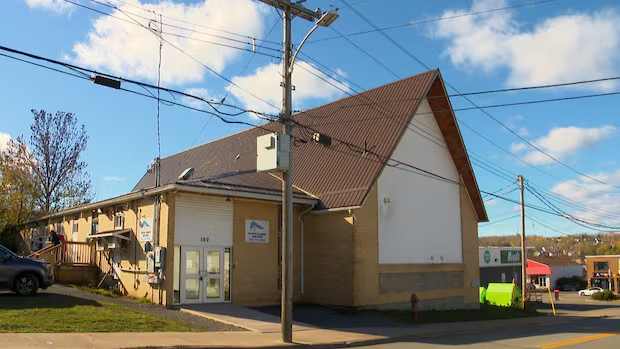This N.S. town has turned on a homeless shelter. The shelter says it’s facing a crisis alone

A homeless shelter in New Glasgow, N.S., has some residents considering moving, businesses claiming they’re losing money and emergency services overburdened, but shelter management says they’re the only ones trying to address a growing crisis.
Viola’s Place has more than doubled its capacity and introduced support programs since opening in 2018 to keep up with a rising homeless population in the area, its executive director says.
The increasing number of homeless people has coincided with a rise in disturbances in the area, according to residents and police.
“It’s just headache after headache,” said resident Raymond Wiseman, who lives near the shelter. “We’ve had enough. When we can arrange it, we’re probably going to try to sell our house.”
Wiseman said it was a quiet neighbourhood when he and his wife moved in 14 years ago. He said in recent years he’s witnessed people using drugs, having sex and going to the washroom on his property.
Raymond Wiseman lives next to the shelter and said the situation is no better despite numerous complaints to the staff and town officials. (Paul Poirier/CBC)
People moved into a dilapidated house next door, he said. They ripped out the copper wiring in the basement, stole the heat pumps outside and threatened the landlord when he confronted the squatters, according to Wiseman.
“A man pulled out a knife on him, so he came running over here banging on the door, trying to get to safety,” he said.
Other residents living near Viola’s Place say they’ve witnessed similar behaviour on their properties. They say they’ve been victims of theft and have heard screaming and fighting at all hours of the day.
Nearby business owners say they’re losing money because customers are afraid to come to the area to shop due to the disturbances and the number of needles on the ground.
“Most of the merchants are now to the point that a lot of us are reconsidering whether we’re going to stay in the downtown or not,” said Janice Arnold, manager of Soley Shoes.
Janice Arnold is the manager of Soley Shoes, which has been open in downtown New Glasgow since 1977. She said if the situation in town doesn’t change, they won’t last another year. (Paul Poirier/CBC)
None of this is a surprise to Lisa Deyoung, executive director of Viola’s Place, who said she warned the municipality that crime, public drug use and homelessness would increase if additional services weren’t established.
“You can’t expect a problem to resolve itself when we’re the only ones tackling it,” Deyoung said.
“As long as a charity can be blamed for societal issues, it takes the responsibility off of government,” she said.
There needs to be collaboration among multiple agencies and all levels of government, she said, but the town and the shelter are at odds with each other.
“We tried to form a relationship with our shelter and their board and their staff,” said Mayor Nancy Dicks. “But I just feel that really didn’t produce the outcome that we were hoping for.”
Current response is unsustainable
The issues stemming from a growing homeless population have fallen on emergency services, who say the current response is unsustainable.
Officials at a recent town hall meeting said responding to incidents related to homelessness, mental health and addiction cost police, fire and ambulance services an additional $1 million a year.
Modern policing wasn’t designed to respond to these issues, according to the chief of New Glasgow Regional Police.
“I think the evidence is clear that there is no amount of police resource that is going to take us out of this complex social crisis,” said Ryan Leil.
Chief Ryan Leil said there needs to be compassion when dealing with issues related to homelessness and mental health and addiction, but concerns from the public about safety are legitimate. (Paul Poirier/CBC)
The department spent more than $500,000 alone on these types of calls between January and September, he said.
Leil said they’re seeing up to a 15 per cent increase on average in these types of calls every month.
He said there needs to be a balance between compassion and accountability when dealing with these issues but wouldn’t say specifically who isn’t being held accountable.
“All levels of government, everyone who is engaged in this process, people who are the clients, people who are receiving services, everybody has a shared responsibility and accountability in this process,” he said.
Shelter staff, clients harassed by public
Lisa Deyoung agrees police aren’t the proper response to these kinds of issues.
“We’re using outdated systems to try and tackle new issues that society is dealing with,” she said.
Relocating the shelter isn’t the solution either, Deyoung said, because it just moves the problem elsewhere and creates an unnecessary cost for taxpayers.
The one thing shelter staff and municipal officials do agree on is the solution requires building supportive housing in New Glasgow like the models that exist in Halifax.
“I’m happy to see that happening in Halifax, HRM, but we need those in our small rural communities,” said Dicks.
Lisa Deyoung, executive director of Viola’s Place, said rising rent costs, mass evictions and no supportive housing are all fuelling a growing homeless population in town. (Paul Palmeter/CBC)
Opportunities and Social Development Minister Barbara Adams declined an interview request.
In a written statement, a spokesperson did not answer when New Glasgow, and other rural communities, might receive support housing. In the meantime, Deyoung said homelessness and related issues are only going to get worse in the community.
This shelter has reduced daytime hours because of what she called “pressure” from the municipality. She said staff quit because of stress and harassment.
“We have people driving by and throwing eggs at our staff and clients, screaming derogatory names at us,” Deyoung said.
The remaining staff, however, are still dedicated to doing what they can to address the issues in the community, she said.
MORE TOP STORIES





